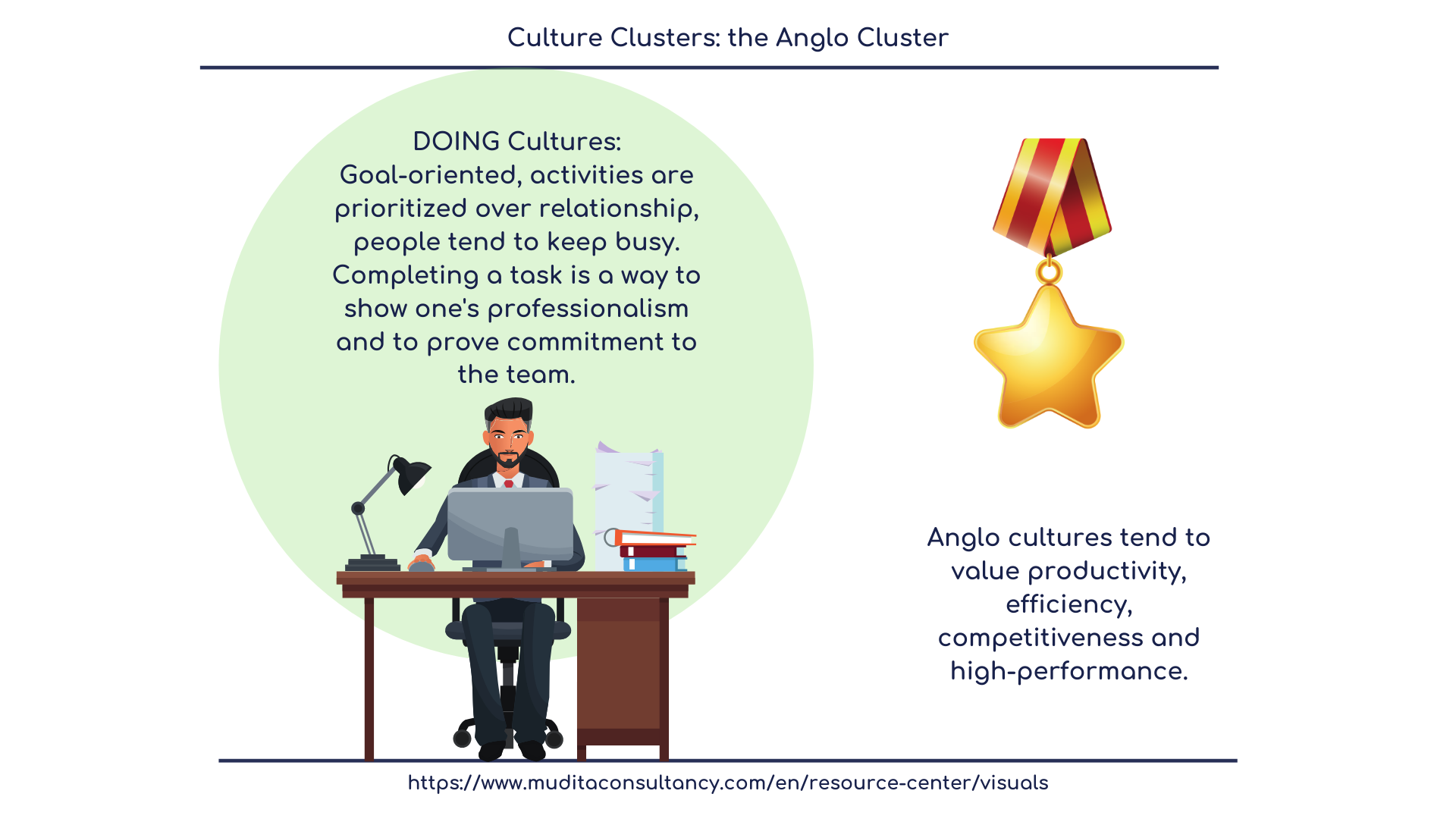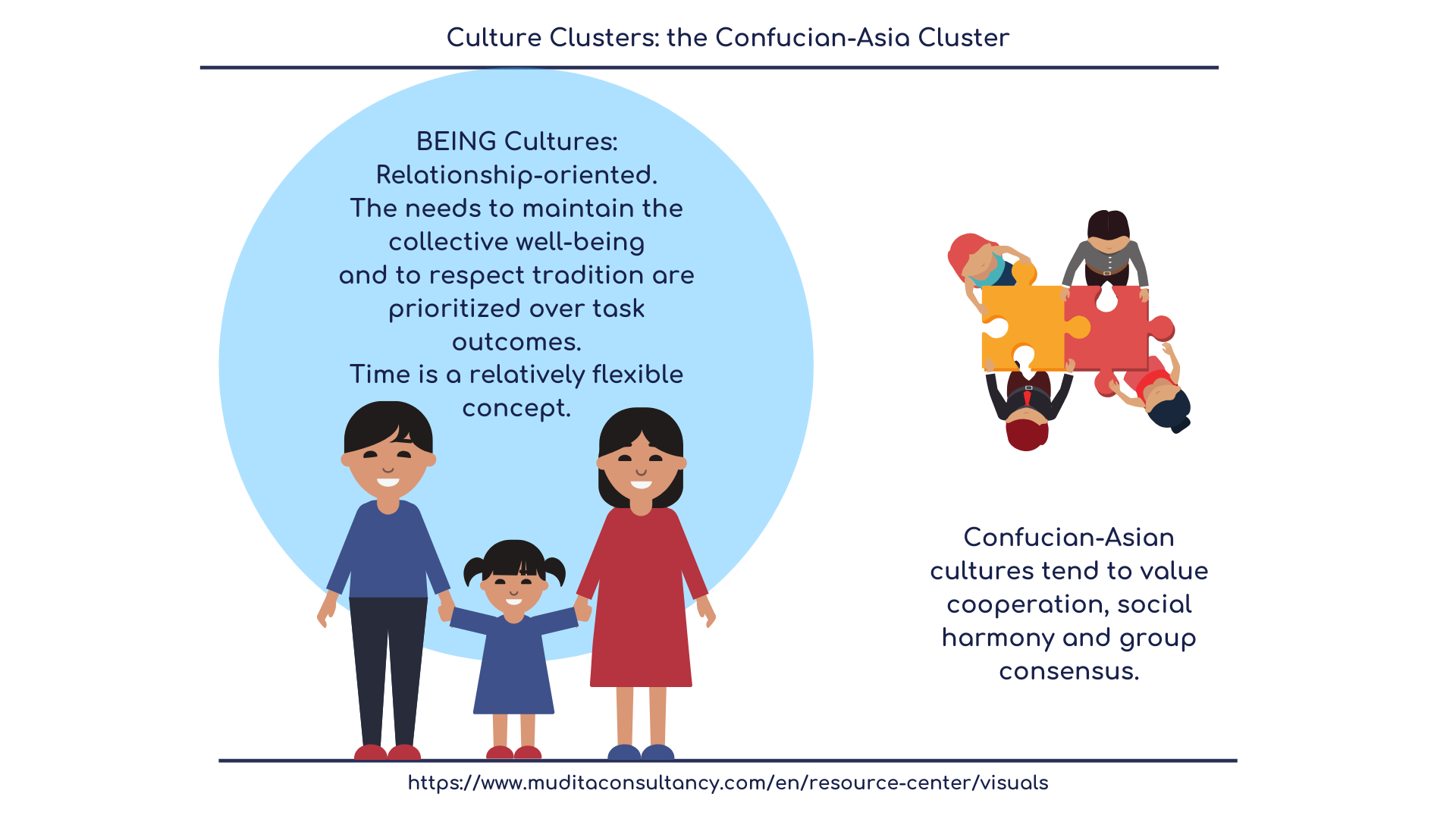Global Leadership, An Introduction to Culture Clusters
Dear readers,
Those of you who’ve been following this blog for the past few months might be already familiar with Hofstede’s framework and with the concept of cultural dimensions (infographics available here): let me now introduce you to Project GLOBE (Global Leadership and Organizational Behavior Effectiveness Research), a study about Leadership behaviours and practices conducted across 62 “societal cultures” (note: not Countries or Nations, for the research is meant to be considered from a social anthropology rather than a political perspective) that expands on existing research.

The Globe Project groups the societal cultures object of the study into ten major culture clusters, characterised by nine cultural dimensions.
Culture Clusters
- EASTERN EUROPE (Albania, Georgia, Greece, Hungary, Kazakhstan, Poland, Russia, Slovenia);
- GERMANIC EUROPE (Germany, Austria, The Netherlands, German speaking Switzerland);
- NORDIC EUROPE (Denmark, Finland, Sweden);
- LATIN EUROPE (France, Italy, Spain, Portugal, French speaking Switzerland, Israel);
- ANGLO (Australia, English speaking Canada, New Zealand, Ireland, UK, South Africa - White population -, United States of America);
- LATIN AMERICA (Brazil, Guatemala, Argentina, Ecuador, El Salvador, Colombia, Bolivia, Costa Rica, Venezuela, Mexico);
- CONFUCIAN ASIA (China, Hong Kong, Singapore, Japan, South Korea, Taiwan);
- SOUTHERN ASIA (India, Indonesia, Iran, Malaysia, the Philippines, Thailand);
- SUB-SAHARAN AFRICA (Namibia, Zambia, Zimbabwe, South Africa - Black population);
- MIDDLE EAST (Qatar, Egypt, Morocco, Turkey, Kuwait);
GLOBE Cultural Dimensions (*may overlap with Hofstede’s cultural dimensions)
- Performance Orientation indicates the extent to which a society values and rewards performance improvement, individual achievement, excellence (“doing cultures” are performance oriented);
- Uncertainty Avoidance indicates the extent to which individuals are comfortable around risks, ambiguity, and unpredictability. Countries that score high on the Uncertainty Avoidance dimension value order, rules, laws and regulations (see here for further insight);
- Humane Orientation indicates the extent to which individuals or a society emphasizes altruistic, caring, nurturing behaviour. In nations that score high in this particular dimension, individuals are responsible for the collective well-being (note the similarity between Globe’s Humane Orientation and Hofstede’s Masculinity/Femininity cultural dimensions);
- Institutional Collectivism indicates the extent to which collective distribution of resources and group loyalty are encouraged, rewarded and prioritized over individual pursuits (Asian and Scandinavian cultures tend to score high in this dimension: see infographics on Individualism/Collectivism and Masculinity/Femininity for further insight);
- In-Group Collectivism indicates the extent to which people identify with the social groups they belong to - such as families and organizations -, and the degree to which social expectations condition individual behaviour. In societies that score high in this dimension there is a strong tendency to distinguish between in-groups and out-groups (see infographics on Individualism/Collectivism and High-and Low-Context Cultures for further insight);
- Assertiveness indicates the extent to which members of a certain society are direct, competitive and often confrontational;
- Gender Egalitarianism indicates the extent to which a society values and emphasizes equality between genders (with regard to Hofstede’s framework, societies that score high in Gender Egalitarianism overlap with “Feminine” societies as per Hofstede’s definitions and classification);
- Future Orientation indicates the extent to which members of a certain society prioritize long-term planning and delayed gratification over short-term gains;
- Power Distance indicates the extent to which members of a certain society tolerate and accept unequal distribution of power and wealth. In countries that rank high on the Power Distance Index respect is a concept usually associated with seniority and/or social status, authority is rarely or never questioned; strong hierarchical structures are the norm, individual initiative and expression of disagreements with the “power holders” are not encouraged (see infographic on Power Distance for further insight).
Here’s an example of how to use all the available resources in combination:
With regard to leadership styles, what are some the possible challenges an executive coming from the Anglo cluster is going to face in managing a local team in the Confucian-Asian cluster?
An executive coming from the Anglo cluster will most likely value competitiveness, performance, and will prioritize the achievement of organizational goals over harmonious relationships…

…local workers, on the other hand, will be more concerned with cooperation, consensus, and with the need to maintain social harmony…

In a scenario in which objectives are not met, a negative feedback session or a negative performance evaluation might ensue.
Someone who comes from a society where guilt is the main tool of social control, may not be fully aware of the implications of “standard” negative feedback delivered to someone who comes from a “shame culture”:


How’s this story going to end?
Some articles on the main differences between the Anglo-And the Confucian-Asian cluster are available at the following links:
- I/II Motivation and Reward Across Different Cultures
- II/II Motivation and Reward Across Different Cultures (Introduction to Guilt-and Shame Cultures)
- Giving and losing "face": honour, social reputation and networking in Asian countries
- Social and business connections in China: an insider’s perspective on guanxi
SOURCES:
- Chhokar, Jagdeep S., Brodbeck, Felix C., House, Robert J. (eds.). (2008). “Culture and Leadership across the World: The GLOBE Book of In-Depth Studies of 25 Societies”. New York: Taylor & Francis
- Hofstede, Geert H.; Hofstede, Gert Jan (2005). ”Cultures and organizations: software of the mind (2nd ed.)”. New York: McGraw-Hill
- House, R.J., Hanges, P.J., Javidan, M., Dorfman, P.W., & Gupta, V. (eds.). (2004). “Culture, Leadership, and Organizations: The GLOBE Study of 62 Societies”. Thousand Oaks: Sage Publications
- Javidan, Mansour; Dorfman, Peter W.; Luque, Mary Sully de; House, Robert J. (2006). "In the Eye of the Beholder: Cross Cultural Lessons in Leadership from Project GLOBE". The Academy of Management Perspectives. 20 (1): 67–90. doi:10.5465/amp.2006.19873410
- Pellegrini, Ekin K.; Scandura, Terri A.; Jayaraman, Vaidyanathan (2010). "Cross-Cultural Generalizability of Paternalistic Leadership: An Expansion of Leader-Member Exchange Theory". Group & Organization Management. 35 (4): 391–420. doi:10.1177/1059601110378456
Travel vector created by freepik - www.freepik.com

